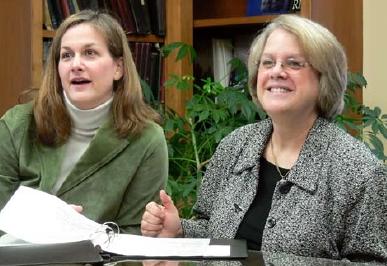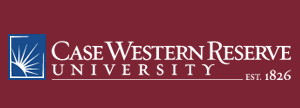Last spring, child advocacy groups in Ohio helped persuade state legislators to approve $270 million in new funding for early childhood programs. It was a victory for a coalition that had spent years issuing policy briefs, meeting with public officials, and mobilizing citizens to campaign for expanded day care, high-quality pre-kindergarten, and services for children with social or behavioral problems.
Thanks to a program created by the Schubert Center for Child Studies with support from the Mann Endowment Fund, students in the College of Arts and Sciences have actively participated in such efforts. As "externs" with local nonprofits, such as the Center for Community Solutions and Voices for Children of Greater Cleveland, they have worked as researchers, civic activists, and liaisons between policy analysts and government officials. The first Mann Child Policy Externships were awarded in spring 2005.
"This is a great opportunity for students to find out how policy is made and to learn what role organizations play," says Molly Irwin, director of the Schubert Center's Child Policy Initiative, who coordinates the program. "At the same time, we want the program to be of service to those organizations, and make sure that the students we place with them are contributing." All signs indicate that the program has met this goal from the beginning.
The Political Bug
Rebecca Cohen was a senior sociology major when she first heard about the Mann externships. In fall 2004, in the weeks leading up to the vice presidential debate at Case Western Reserve, she'd been "bitten by the political bug." When the candidates talked policy, she says, "it sparked my interest."
Cohen applied to the Mann program and was invited to join the Center for Community Solutions, where she wrote policy briefs for a statewide early care and education campaign.
"I was applying a lot of the knowledge that I had gained in my course work," Cohen says. "And I could see it making a difference on a real level. Those policy briefs were passed out across the state; they were given to business people and policymakers. I could see my research influencing the policies that were going to be made."
After she graduated, Cohen joined the center full-time as campaign coordinator. Over the next two years, she met with legislators, trained child service providers to advocate for policy reforms, and became a mentor to subsequent Mann externs. While guiding their research on specific policy issues, she also made a point of showing them "the bigger picture." For example, she invited them to community meetings to observe the campaign's grassroots operations, and to steering committee meetings to watch the leadership in action.

Gennifer Gibbs
Gennifer Gibbs, one of the students who joined Cohen at the Center for Community Solutions, is a double major in psychology and economics with a minor in childhood studies. Now, she says, when she hears professors lecture on labor markets or urban development, she is aware of the realities beyond the dry economic models. Her experience in the Mann program, she explains, has given her "a whole other perspective."
Last year, Cohen left Cleveland to pursue a master's degree in public policy at the University of Michigan. Gibbs, who will graduate in 2009, plans to enter a joint program in public policy and law. Both have embarked on career paths that were unknown to them before they began their externships.
A New Direction
The sponsorship of child policy externships has marked a new direction for the Mann Endowment Fund. Created by alumni siblings Carol Mann (Flora Stone Mather '71) and Robert Mann (Western Reserve College '73), the fund originally supported an experiential learning seminar that focused on health care delivery to infants. Students met with local parents who had brought their babies to the hospital for "well child" care. Many of the students also traveled abroad to conduct research on health care and health-related issues in countries such as Mongolia, Samoa, Uganda, and Thailand.

Molly Irwin (left), director of the Child Policy Initiative, and
Jill Korbin, director of the Schubert Center for Child Studies.
In those years, the Mann initiative focused on practice, not policy; students interacted with patients and service providers, not with legislators and activists. But the impact of policy decisions on children and families was impossible to ignore. When the 1990s brought cutbacks in "well child" services, the students' contact with the clients diminished. Eventually, the Mann seminar was succeeded by the child policy externship program.
Along with providing stipends to externs who work beyond the required 10 hours a week, the Mann Endowment Fund currently supports two related activities:
During spring break, students in a child policy course taught by Molly Irwin travel in alternate years to the state capital or to Washington, D.C., where they meet with officials, attend legislative hearings, and speak with experts from government agencies, think tanks, and advocacy groups.
Mann externs attend a major research conference with a child policy component. The national meetings of the Society for Research in Child Development and the Society for Research on Adolescence are held in alternate years; the externs go to presentations, collect the latest findings in their areas of interest, and then report back to their peers.
The experience that the Mann program offers students in the College is nationally distinctive. "Our program is one of the few that focuses on undergraduates," says Jill Korbin, director of the Schubert Center. "We believe that you have to get students into this pipeline early." She adds, though, that externships are equally valuable for students who won't wind up in policy careers. "We think it's important for future pediatricians, lawyers, or social workers, for example, to have an understanding of what good policy is and how it is formed."
To Cohen, the legislative success of the Ohio Early Care and Education Campaign proved that child policy can bridge party divisions. The campaign worked closely both with Democratic Governor Ted Strickland and with members of the Republican-dominated legislature. "We had a true bipartisan effort at the state level," Cohen recalls. And ultimately, "the Republicans increased the amount for public pre-kindergarten over the governor's request—which was a huge win. So that gave me hope that child policy issues can transcend 'dirty politics.'"
Looking back on the externship that got her involved in the process, Cohen declares, "I can't say enough about it. It was really one of the best things I did—one of the most influential things I did—as an undergraduate."
The Schubert Center's Child Policy Initiative (CPI) was established in 2004 with generous support from the George Gund Foundation. Last fall, the Foundation awarded CPI an additional grant to sustain its operations through 2009.
